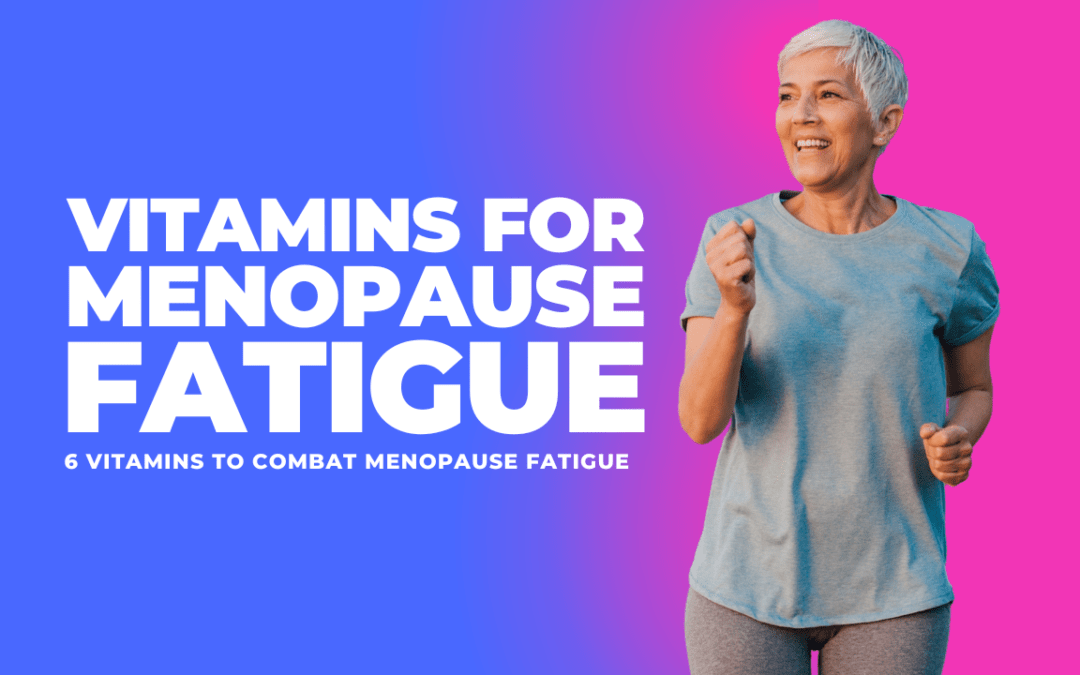Menopause is a natural transition in a woman’s life, but it often comes with unwanted symptoms. One of the most common complaints is persistent fatigue. This overwhelming tiredness can interfere with daily life, making simple tasks feel exhausting. Hormonal fluctuations, sleep disturbances, and changes in metabolism all contribute to this problem.
One way to counteract menopause-related fatigue is by ensuring proper nutrition. Several essential vitamins can help regulate energy levels, improve mood, and support overall well-being. Below, we outline six key vitamins that can make a difference.
1. Vitamin B12
Why Vitamin B12 Matters
Vitamin B12 is essential for producing red blood cells and maintaining nerve function. Low levels of this vitamin can lead to fatigue, brain fog, and weakness, all of which can worsen during menopause.
Best Sources of Vitamin B12
- Lean meats (beef, pork, chicken)
- Fish (salmon, tuna, trout)
- Dairy products (milk, yogurt, cheese)
- Eggs
- Fortified cereals and plant-based milk alternatives
How to Ensure Adequate Intake
Many women experience a decline in their ability to absorb B12 as they age. If dietary intake is insufficient, a B12 supplement or injections prescribed by a healthcare provider can help.
2. Vitamin D
Why Vitamin D Matters
Vitamin D plays a critical role in bone health, immune function, and mood regulation. During menopause, women face an increased risk of osteoporosis, and low vitamin D levels can contribute to fatigue and muscle weakness.
Best Sources of Vitamin D
- Sunlight exposure (15-30 minutes per day)
- Fatty fish (salmon, mackerel, sardines)
- Fortified dairy products
- Egg yolks
- Mushrooms
How to Ensure Adequate Intake
Many women struggle to get enough vitamin D from food and sunlight alone. Blood tests can determine deficiency, and if needed, a vitamin D3 supplement can help maintain optimal levels.
3. Vitamin E
Why Vitamin E Matters
Vitamin E is an antioxidant that helps protect cells from oxidative stress. It has been found to alleviate hot flashes, night sweats, and other menopause symptoms that contribute to fatigue.
Best Sources of Vitamin E
- Nuts and seeds (almonds, sunflower seeds)
- Spinach and kale
- Avocados
- Vegetable oils (sunflower, safflower, olive)
How to Ensure Adequate Intake
Vitamin E is primarily obtained through diet, but supplements may be beneficial for those struggling with severe menopause symptoms.
4. Vitamin B6
Why Vitamin B6 Matters
Vitamin B6 helps produce neurotransmitters like serotonin and dopamine, which regulate mood and energy levels. Many women experience mood swings and increased anxiety during menopause, and B6 can help balance these emotions.
Best Sources of Vitamin B6
- Poultry (chicken, turkey)
- Fish (salmon, tuna)
- Bananas
- Potatoes and starchy vegetables
- Fortified cereals
How to Ensure Adequate Intake
Women who experience chronic fatigue and mood disturbances during menopause may benefit from a B6 supplement, particularly if their diet lacks sufficient sources.
5. Vitamin C
Why Vitamin C Matters
Vitamin C is a powerful antioxidant that supports immune health, collagen production, and iron absorption. Many women in menopause experience joint pain and dry skin, both of which vitamin C can help alleviate.
Best Sources of Vitamin C
- Citrus fruits (oranges, grapefruits, lemons)
- Berries (strawberries, blueberries, raspberries)
- Bell peppers
- Broccoli and Brussels sprouts
- Kiwi
How to Ensure Adequate Intake
Eating a diet rich in fresh fruits and vegetables usually provides enough vitamin C. However, supplementation can help those with dietary restrictions.
6. Magnesium
Why Magnesium Matters
Magnesium is essential for energy production, muscle function, and stress reduction. Many women experience sleep disturbances and increased anxiety during menopause, and magnesium can improve relaxation and sleep quality.
Best Sources of Magnesium
- Leafy greens (spinach, kale)
- Nuts and seeds (almonds, pumpkin seeds, cashews)
- Whole grains (quinoa, brown rice, oats)
- Legumes (black beans, lentils)
How to Ensure Adequate Intake
Since magnesium is depleted through stress and poor diet, supplementation may be necessary for some women, especially those experiencing muscle cramps or insomnia.
Incorporating These Vitamins into Your Diet
Eating a nutrient-rich diet is the best way to ensure adequate vitamin intake. However, menopause-related changes can affect nutrient absorption, making supplementation necessary in some cases. Speak with a healthcare provider before starting any new supplements to determine the right dosage for your needs.
Additional Lifestyle Modifications to Enhance Energy Levels
Along with proper nutrition, lifestyle changes can help combat menopause fatigue:
- Regular Physical Activity: Engaging in low-impact exercises like yoga, swimming, and walking can boost energy levels and improve mood.
- Prioritize Quality Sleep: Maintaining a consistent sleep schedule and practicing good sleep hygiene can reduce fatigue.
- Manage Stress: Meditation, deep breathing exercises, and engaging in relaxing activities can help lower stress levels.
- Stay Hydrated: Dehydration can worsen fatigue, so aim to drink plenty of water throughout the day.
How Amazing Meds Can Help
At Amazing Meds, we specialize in hormone optimization to support women through menopause. Our Bioidentical Hormone Replacement Therapy (BHRT) is designed to alleviate fatigue, hot flashes, and other menopause symptoms through personalized treatment plans. Our process includes:
- Comprehensive health evaluations to assess hormone levels
- Customized treatment plans based on individual needs
- Convenient home delivery of doctor-prescribed hormone therapies
- Support from experienced medical professionals
If you’re struggling with menopause-related fatigue and want a personalized approach, Amazing Meds is here to help.
Reclaim Your Energy and Well-Being
Menopause fatigue doesn’t have to control your life. By prioritizing essential vitamins, making lifestyle adjustments, and exploring professional treatment options, you can regain your energy and feel like yourself again. Take charge of your health today and explore how Amazing Meds can support your wellness journey.
Disclaimer: This article is for informational purposes only and does not replace professional medical advice.

